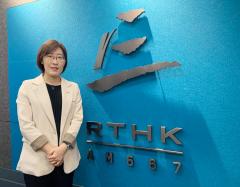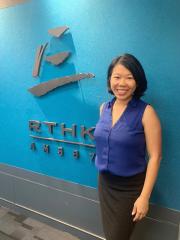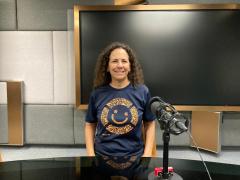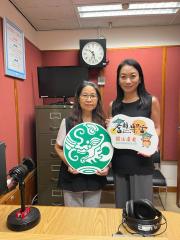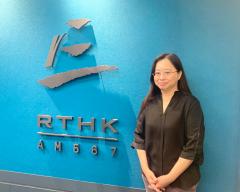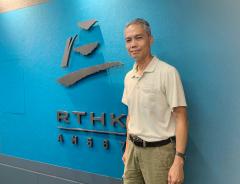簡介
Listen to #Hashtag Hong Kong every Sunday morning at 8.15
Focussing on issues affecting civil society, we'll hear from representatives of NGOs, associations, statutory bodies, and non-profit groups.
(Sundays 8.15am - 8.25am)
最新

Chris Leung, Social Worker, The Lok Sin Tong Benevolent Society
Hi everyone, I am Chris, the Deputy Centre-in-Charge of the Sham Shui PO Community Living Room of the Lok Sin Tong Benevolent Society, Kowloon.
According to the "Long-Term Housing Strategy - Annual Progress Report 2022," the government has secured sufficient land to build public housing units, fulfilling the supply targets for the next ten years. However, as the allocation of land for housing is not evenly distributed annually, only about one-third of these units will be completed in the first five-year period.
Hong Kong nowadays is facing a housing shortage, and many citizens would choose to live in subdivided flats. According to statistics released by the Census and Statistics Department in 2021, there are approximately 108,200 subdivided units for rent in Hong Kong, with an average of 3-4 partitioned rooms per unit. The median living space per person is only 56.5 sq. ft., lower than the 75 sq. ft. standard for public housing and the 161.5 sq. ft. for the average household in Hong Kong.
Apart from limited living spaces, subdivided units are also facing several problems like heavy water and electricity charges, safety issues, etc. The poor living environment has poses impacts on residents’ physical and mental health that most of them have to bear heavy financial burden and parenting.
In view of that, the Social Welfare Department (the "SWD") launched the "Community Living Room Pilot Scheme" funded by the Community Care Fund. The Sham Shui Po Community Living Room Project locates in Fuk Wa Street, Sham Shui Po, in where subdivided housing is concentrated. The Project focuses on supporting subdivided unit households, especially those with children, in order to alleviate the difficulties they face while waiting for public housing and living in poor conditions, and provide critical support during the transition period.
As a Government, Business, and Community tripartite collaboration project, the government has appointed THE LOK SIN TONG BENEVOLENT SOCIETY, KOWLOON, as the approved service organization to operate the Project, providing shared living spaces including pantry, dining room, living room, study and activity room, children's play facilities, fitness facilities, and self-service laundry facilities, as well as providing community information, health talks, After-school Learning and Support Programmes, community support and referral services. The Sham Shui Po Community Living Room has commenced operation since December 2023. It will operate for a period of three years. With the support of various sectors, the Project has already recruited over 500 families to provide them with services.
In this cross-sectoral collaboration project, not only could the users enjoy additional living space, but they could also broaden their social networks, thereby improving their quality of life and increasing their sense of community belonging. The after-school study support, provided by the Community Living Room, is aimed at alleviating pressure on parents to supervise their children’s homework. The project not only relieves the onus on parents as caretakers; it also lightens their housekeeping workload. Living in a relatively small and crowded flat, most of the users do not have space at home for a washing machine and need to wash clothes by hand. Now, however, they are able to make use of laundry services in the Community Living Room, which are available at an affordable price. User can build up their social network in the Community Living Room as well.
We will continue to actively expand the scope of services, and strive to help the sub-divided unit households in the Sham Shui Po district to improve their living space, sense of community belonging, and social networks after using the community living room facilities. In the long run, to elevate the living standards and enhance community belonging of grassroots citizens, we believe that with the participation of the business sector in setting up more Community Living Rooms in districts clustered with subdivided unit households, more grassroots families will benefit.
Three community living room projects in To Kwa Wan, Hung Hom and Nam Cheong are expected to commence operations gradually to provide support for subdivided unit households, particularly those with children. These four community living rooms are expected to serve 1,750 subdivided households, encompassing a population of around 270,000 individuals each year, to provide a better living standards for the residents.
And now I have a song I'd like to dedicate to all of you listening. My song is: "陪著你走” by Rubber Band
重溫
Fiona Nott, CEO of The Women's Foundation
Dear Hong Kong Community,
When I spoke with you all two years ago, we were facing grim circumstances. COVID had caused separation and devastation, and it was unclear just how far its impact would extend and for how long. But now, thanks to the collective efforts and sustained hope of each and every one of you, we are looking out to new, brighter horizons.
Hong Kong aspires to take its place as a cultural powerhouse on a global stage – and there’s so much this city has to offer the rest of the world. However, before we can do so, we must address our rapidly ageing society and economic challenges fuelled by a persistent talent shortage. One way for us to meaningfully address some of these issues is through closing the gender gap.
The benefits of gender equality are clear and long established: Happier families. Better business outcomes. A more robust economy. These benefits help everyone, regardless of gender.
But our city is far from reaping the benefits of gender equality. Only 48% of women are in the workforce, this is lower than many of our neighbours including Singapore, Australia and Japan. Women are 10 times more likely than men to cite household responsibilities as a key reason for not being economic contributors. For every HK$10 earned by a man, women earn just HK$8.5. These are but a few of the numerous gender inequalities that continue to permeate areas such as safety, mental health, poverty, and career advancement, among others.
What is preventing us from closing the gender gap?
A key barrier to progress is zero sum thinking – where individuals believe that promoting the rights and opportunities of one gender will diminish and devalue another. A “you lose, I win” mindset.
We know the zero-sum mindset is prevalent in Hong Kong: 38% of men and 52% of women believe gender equality is a women’s issue and men need to stay out of the way, and 47% of men and 29% of women believe women benefit most from a gender equal society.
We need people of all genders to model inclusive mindsets, to ensure that the full constellation of diverse voices are heard and valued. To ensure there are equitable opportunities, policies, and distribution of resources.
And while government and businesses all play a part in making this happen, none of this change is possible without individual action and buy-in. So how can we each #InspireInclusion this IWD? Here are three ways to start:
1. Learn about the issues. Understand how gender inequality harms people of all genders and what forms this can take. Look at how this issue intersects with, and is complicated by, other identity factors such as race / ethnicity, culture, sexual orientation, ability, religion, socio-economic background and more.
2. Talk about it. At work and at home talk about how the zero sum mindset might unintentionally show up. For instance, the misconception that if a male colleague advocates for gender equality at work it may negatively impact their own career or the misbelief that if a woman takes on more responsibilities at work, it will negatively impact the well-being of their family at home. Explore pushback or resistance to the idea that gender equality benefits everyone and share ideas on how best to tackle this.
3. Do the work and be an ally. Commit to listening, learning and acting. Use gender inclusive language. Refrain from phrases, jokes or cultural references that perpetuate stereotypes about any one gender. Actively intervene when you hear someone else perpetuating stereotypes. Help others see the benefits of gender equality.
These are just a few of the many, many actions each of us can take.
I know this is no easy task. Reflecting on our own internalised biases and assumptions and then taking action to address these areas is challenging, ever-evolving work at an individual, organisational and societal level.
As CEO of The Women's Foundation, I know an inclusive, gender equal city is possible. I have seen first-hand the exceptional results that follow when individuals and organisations put in the effort to understand how gender inequality harms people of all genders, determine where they might be perpetuating biases and take initiative to change.
Our Mentoring Programme and Male Allies communities are inclusively leading in their companies and in our community; our Young Allies are influencing the next generation of gender equality advocates; and our Girls Go Tech Programme participants are not just ensuring future STEM fields are more gender equal, they will be working to solve some of the most challenging issues of our time.
The work of each of us – as individuals, organisations, communities – matters. And when our efforts are combined, the results are transformational.
Join us to #InspireInclusion this International Women's Day and take steps for a gender equal future through your words and actions.
I'd like to dedicate this song to the women and girls of Hong Kong – and all gender equality advocates. The song is In debt by a local band Riddem.







